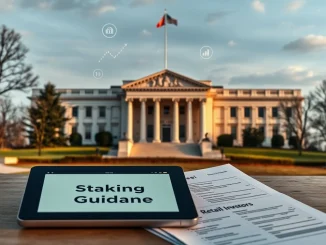
In a landmark ruling that sends ripples of optimism through the decentralized finance (DeFi) space, Uniswap Labs has scored a significant legal triumph. The Second Circuit Court of Appeals has upheld a previous dismissal of a class action lawsuit against the leading decentralized exchange. This victory is being hailed as a crucial moment for DeFi, providing much-needed clarity amidst ongoing regulatory uncertainties. Let’s dive into the details of this pivotal decision and explore what it means for the future of decentralized platforms.
Why is the Uniswap Lawsuit Dismissal a Big Deal for DeFi?
The lawsuit, initially filed in the U.S. District Court for the Southern District of New York, alleged that Uniswap Labs was operating as an unregistered broker-dealer. Plaintiffs argued that Uniswap facilitated the sale of unregistered securities by listing tokens on its platform that they claimed possessed characteristics of securities. This legal challenge struck at the heart of DeFi’s operational model, questioning the liability of decentralized protocols for user actions on their platforms.
However, the courts have now twice sided with Uniswap Labs, firmly stating that the platform cannot be held responsible for how third parties utilize its open-source smart contract code. This ruling is significant for several key reasons:
- Validation of DeFi’s Decentralized Nature: The court’s decision recognizes the fundamental difference between a centralized exchange and a decentralized protocol like Uniswap. It acknowledges that Uniswap Labs provides a technology platform, not a brokerage service in the traditional sense.
- Reduced Regulatory Uncertainty: The lawsuit dismissal offers a degree of legal clarity for DeFi platforms navigating the complex landscape of crypto regulation. It suggests that courts are beginning to understand the nuances of decentralized technology and are hesitant to apply traditional financial regulations directly to these novel systems.
- Protection for Open-Source Code: The ruling reinforces the principle that developers of open-source software should not be liable for misuse of their code by third parties. This is vital for innovation in the blockchain space, where open-source development is prevalent.
- Positive Market Sentiment: News of the victory has been met with enthusiasm within the crypto community, potentially boosting investor confidence in DeFi projects and the broader cryptocurrency market.
Decoding the Allegations: What Was the Lawsuit About?
To fully grasp the significance of this legal win, let’s break down the core allegations of the class action lawsuit against Uniswap Labs:
- Unregistered Broker-Dealer: The plaintiffs argued that Uniswap Labs should be classified as an unregistered broker-dealer under U.S. securities laws. This classification would impose stringent regulatory requirements, including registration with the SEC (Securities and Exchange Commission) and compliance with investor protection rules.
- Facilitation of Unregistered Securities Sales: The lawsuit claimed that Uniswap enabled the trading of tokens that should be considered securities without proper registration. Plaintiffs asserted that Uniswap had a responsibility to vet and control the tokens listed on its platform.
- Lack of Disclosure: Another key argument was that Uniswap failed to disclose to users that some tokens traded on its platform might be unregistered securities, thus exposing investors to undue risk.
The court’s dismissal effectively rejects these arguments, affirming that Uniswap’s role as a technology provider does not equate to that of a traditional financial intermediary responsible for policing token listings.
Hayden Adams’ Reaction and the DeFi Community’s Response
Uniswap founder Hayden Adams took to X (formerly Twitter) to share his elation, stating, “Uniswap Labs just won our Second Circuit appeal! Another HUGE win for DeFi! 🙏 Thank you to the court for protecting open source technology in the US.”

Hayden Adams’ tweet celebrating Uniswap’s legal victory.
The broader DeFi community has largely celebrated this ruling as a victory for decentralization and innovation. Many see it as a signal that U.S. courts are beginning to adopt a more nuanced and pragmatic approach to regulating DeFi, recognizing its unique characteristics and potential.
What are the Broader Implications for Crypto Regulation?
While this ruling is specific to Uniswap and the allegations in this particular lawsuit, it carries broader implications for the ongoing debate around crypto regulation, particularly in the United States:
- Precedent Setting: The Second Circuit’s decision, being a higher court ruling, could set a precedent for future cases involving DeFi platforms and similar legal challenges. Lower courts may look to this ruling for guidance in interpreting securities laws in the context of decentralized technologies.
- Pressure on the SEC: The ruling may put pressure on the SEC to clarify its regulatory stance on DeFi. While the SEC has taken enforcement actions against some crypto entities, this court decision underscores the need for clearer rules and guidelines that acknowledge the decentralized nature of DeFi.
- Encouraging Innovation: By reducing the immediate threat of overly broad regulatory interpretations, this legal victory could encourage further innovation and development within the DeFi space. Developers and entrepreneurs may feel more confident in building and deploying decentralized protocols without fear of undue legal repercussions for user actions beyond their control.
- Global Regulatory Dialogue: This case and its outcome are being closely watched globally. It could influence regulatory discussions in other jurisdictions grappling with how to regulate DeFi and the broader crypto industry.
Looking Ahead: Navigating the Future of DeFi Regulation
Uniswap’s legal triumph is undoubtedly a positive development for the DeFi sector. However, it’s important to recognize that the regulatory landscape for cryptocurrencies remains dynamic and complex. Here are some key takeaways and actionable insights as DeFi continues to evolve:
- Continued Regulatory Scrutiny is Inevitable: While this ruling is a win, it doesn’t mean DeFi is free from regulatory oversight. Governments and regulatory bodies worldwide are still actively examining how to regulate crypto, and further scrutiny is expected.
- Focus on Compliance and Best Practices: DeFi projects should proactively focus on compliance and adopt best practices to mitigate regulatory risks. This includes implementing robust security measures, enhancing transparency, and engaging in constructive dialogue with regulators.
- Decentralization as a Shield: The Uniswap case highlights the potential benefits of decentralization in navigating regulatory challenges. Truly decentralized platforms, where control is distributed and not concentrated in a single entity, may be better positioned to withstand legal scrutiny.
- Advocacy and Education are Crucial: The DeFi community must continue to advocate for sensible and innovation-friendly regulations. Educating policymakers and the public about the benefits and nuances of DeFi is essential for fostering a supportive regulatory environment.
Conclusion: A Moment of Hope for Decentralized Finance
Uniswap Labs’ victory in the Second Circuit appeal is more than just a legal win for a single company; it’s a resounding affirmation for the principles of decentralization and open-source innovation at the heart of DeFi. This landmark decision offers a beacon of hope, suggesting that courts are beginning to understand the transformative potential of decentralized technologies and are willing to protect them from overly restrictive interpretations of existing regulations. As the crypto industry continues to mature, this ruling will be remembered as a pivotal moment in the ongoing journey to define the future of finance.



